John Woodcock MP, Labour and Co-operative MP for Barrow and Furness, is training to be a Teaching Assistant. In the little spare time he has, John is studying for his Level 3 Teaching Assistant qualification. Why is John doing this? Because he is trying to help improve literacy and maths in local primary schools in preparation for secondary school transition, where levels of attainment are currently dropping. John is required to complete 6 hours minimum in the classroom each week, alongside his Parliamentary work, and is keeping a diary of his efforts here at TA Focus…
Diary of a trainee teaching assistant: part five
First entry in a while, must do better. Showed promise at start of school year,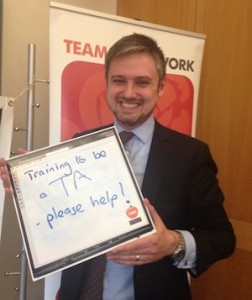 now being distracted by peers and under-performing.
now being distracted by peers and under-performing.
Am not quite on a behaviour contract yet but I will try to do better.
Actually, diary updates aside, I have been pleased with my progress over the last couple of months. Whereas every session I took used to teeter on the brink of chaos as the children realised I could be ignored at will, I now run quite a tight ship without usually having to shout or resort to corporal punishment (that’s still banned, right?) Granada Reports came to film my last guided reading session at Victoria Juniors in Barrow as part of a package looking ahead to the launch of our summer school in August, you can see a snippet here.
Supporting Kinga, an excellent higher level teaching assistant at Johanna Primary in Lambeth, makes me conscious of the supreme effort good schools make to raise the attainment of those towards the bottom of the ability range. Every week, she works one-to-four (or two-to-four when I am there) on tailored literacy lessons for lower ability children who would glaze over and switch off or become disruptive in the main lesson.
But, under Kinga’s guidance, they are making progress; the kind of progress that, were it sustained through subsequent years, would see those children leaving school with decent skills and every chance of getting a job with good prospects.
Determination that not a single child will be left behind is a hallmark of both the schools I work in and what marks out every good school across the country. And from what I have seen so far, raising standards for all simply couldn’t be done without the extra capacity that teaching assistants provide. I know some schools have been criticised for apparently using TAs simply to remove more difficult children out of the classroom without properly focussing on whether they are getting sufficiently skilled teaching to bring them on, but I certainly haven’t seen that in the schools I am in. There, the TAs know their children, understand how they learn and aren’t prepared to settle for making do.
One of the things that makes the results of Johanna Primary, with 86% of pupils attaining level 4 or above in English tests, so remarkable, though, is the background of the children who are enrolled in their reception class or nursery. The school’s emblem, a rainbow, is well chosen. A large majority learn English as an additional language, the reality of which hit home when I was asked by a student what language I spoke when I was at home with my family. This is not a question that would occur to anyone in Barrow. The point is emphasised by the fervency of support for an array of teams in the World Cup now England has been knocked out.
The way many nationalities come together under one roof is a microcosm of the way the capital itself helps forge new generations of Brits. But though my class members have parents who come from many different nations, what is most striking is actually the smallness of the world many of those from the most deprived backgrounds inhabit.
For some, the world is small physically: ten-year-olds who may never or very rarely have walked along the Thames Embankment, or been on the London Eye, or visited the London aquarium, until taken on a school trip – despite the fact they live literally a stone’s throw away.
Others don’t seem to have much concept of the country beyond an all-encompassing idea of London. When I told my lower ability group that I had studied in Edinburgh, which was in Scotland, they looked at me blankly and one asked if Scotland was part of London.
I had similar experiences visiting certain schools in deprived areas in Barrow before I started my training. Barrow is a reasonably compact coastal town. Part of it, Walney Island, has beautiful sandy beaches. Yet many had not seen the sea or played on the sand until taken by their school on a day trip.
Any school, obviously, cannot do everything. As a country we need to do so much better at giving parents the help they need to be able to raise their child’s horizons. But encouraging change that makes a difference in the private, protected space of parenting is hard, many well-intentioned governments have tried and fallen short.
Which makes teachers and teaching assistants who refuse to shrug and walk away so, so important.
Ensuring no child is left behind is not a new slogan. Some have used it without meaning what they say, others have meant it but not really understood what it would take to deliver.
But by God it is essential to our future progress. We will never reach our potential as a nation until we find a way to ensure every single part of our education system fully embraces that goal. And to do that, we must surely understand better why schools like Johanna and Victoria Juniors succeed and others find themselves held back by a myriad of constraints.
But that is for another entry.
Other diary entries:
Diary of a trainee Teaching Assistant: part 1
Diary of a trainee Teaching Assistant: part 2
Diary of a trainee Teaching Assistant: part 3
Diary of a trainee Teaching Assistant: part 4
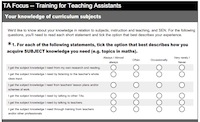 A few months back, TA Focus invited TAs to
A few months back, TA Focus invited TAs to 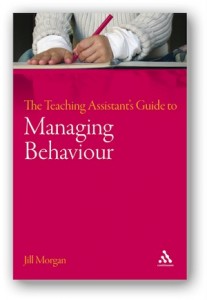
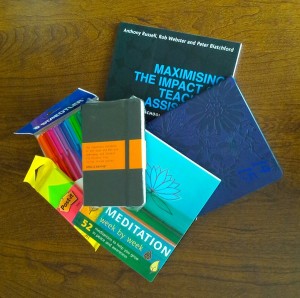
 Every year, SEN support staff and teachers are encouraged to apply for the National Scholarship Fund for any specialist training. Applicants have a small timeframe to apply, as the closing date is just four weeks away.
Every year, SEN support staff and teachers are encouraged to apply for the National Scholarship Fund for any specialist training. Applicants have a small timeframe to apply, as the closing date is just four weeks away.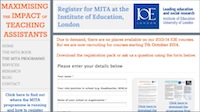
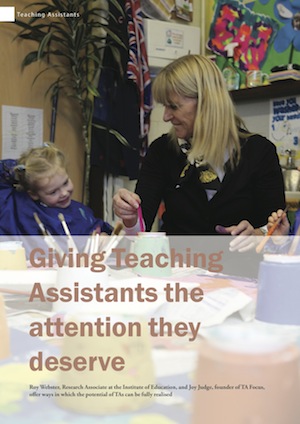
 as little as possible, but inevitably there are moments when it does.
as little as possible, but inevitably there are moments when it does.